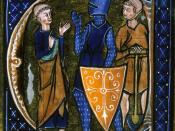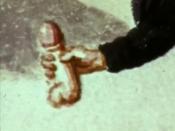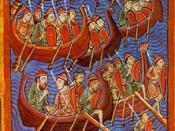Looking at Feudalism with a Medieval Set of Spectacles In ?Fiefs and Vassals, The Medieval Evidence Reinterpreted,? Reynolds attempts, and succeeds, to evaluate the concept of feudalism in the Middle Ages. She is straightforward, stating repetitively that her purpose is to, ?explore the relationships between the modern concepts of the fief and of vassalage on one hand, and the evidence of property law and of social and political relations that [she] finds in medieval sources on the other? (Pg. 14).
Her conclusions are threefold. Reynolds asserts that the modern concept of medieval evolution between a lord, vassal, and a fief are developments of a twelfth century myth (Pg. 475). Her concept is that the free men owned their land, and as landowners, owed a service to their lord, as opposed to the modern concept of vassals who were being paid with a fief for service in the lord?s army (Pg.
477). In addition, she states that the existence of feudal-vassalic institutions was a result of increasing bureaucracy in the government in the twelfth century, not a result of weak and unbureaucratic government of the middle ages. (Pg. 479).
Each of Reynolds? conclusions are supported by overwhelming evidence in the chapters of the book. She begins each individual argument with background on the subject, describing the traditional theories in detail. She then continues on to describe why the previous beliefs were wrong, and where they went wrong. This can be seen in chapter 2.1 where she describes the concept of vassalage, then in chapter 2.2 where she describes why this concept is incorrect.
Reynolds entire book sets to prove that, ?the concept of vassalage and of the fief, as they have been developed since the sixteenth century, originated in the work of the sixteenth century scholars rather than in the late medieval texts they studied? (Pg. 6). She rejects te concept of feudalism in the middle ages based on the lack of defined medieval fiefs and vassalages.




